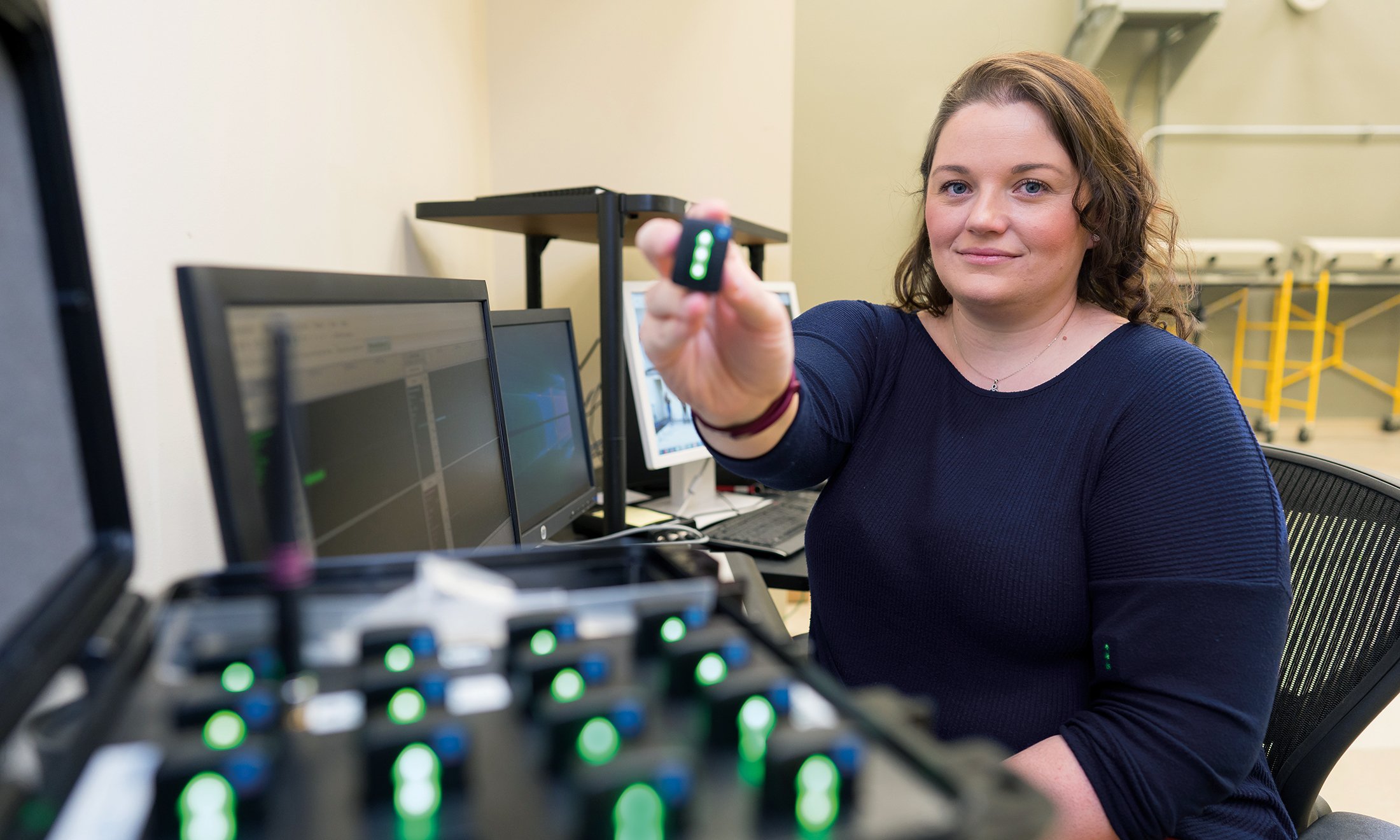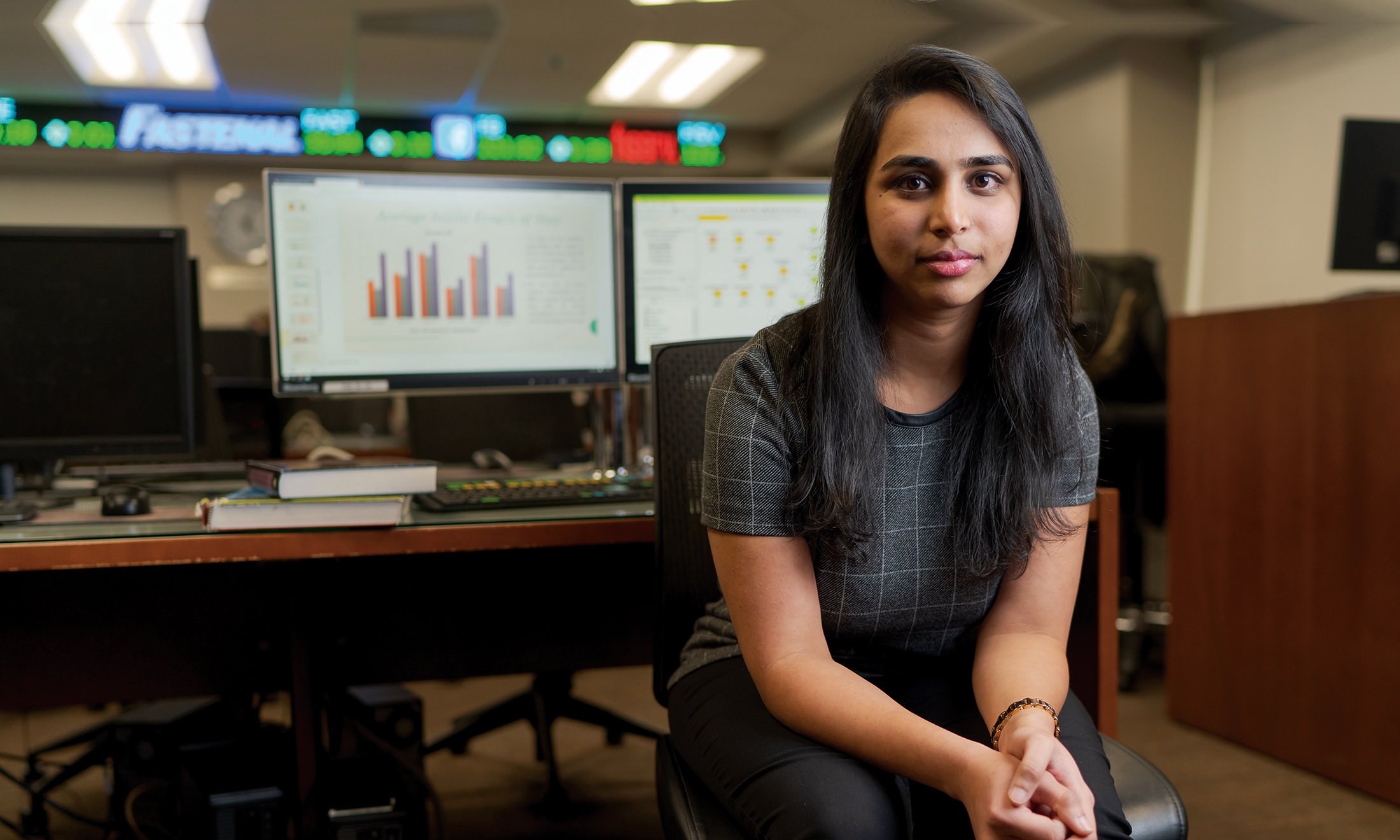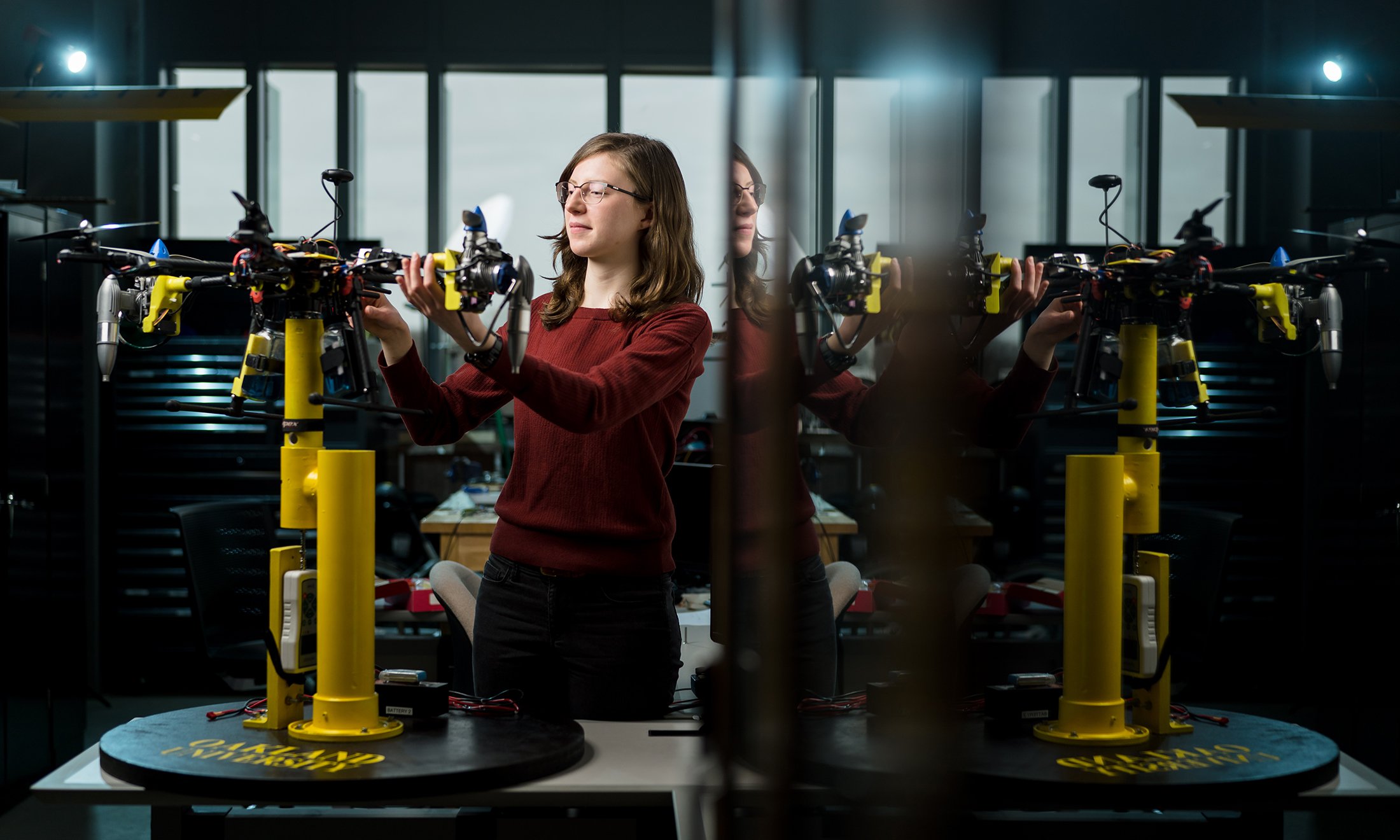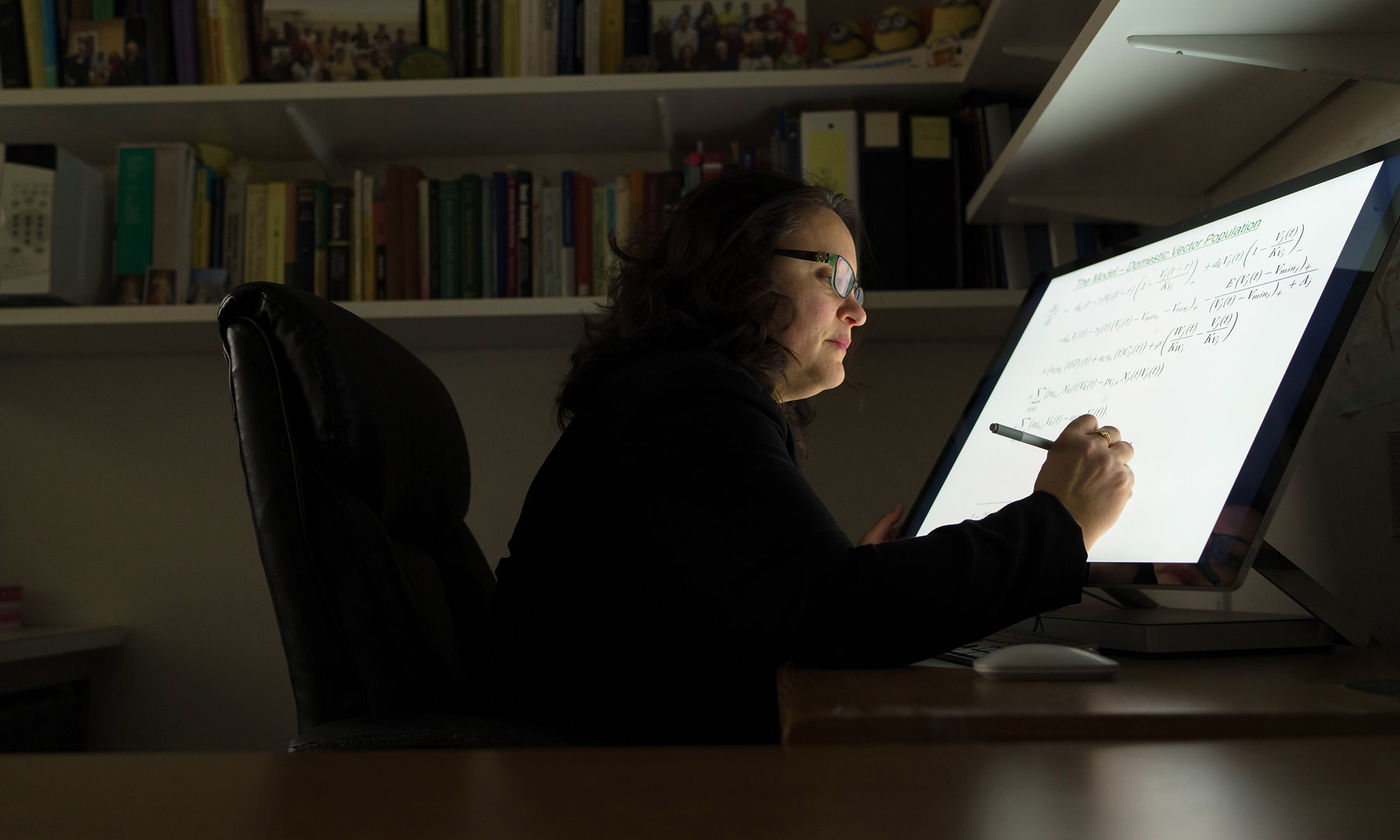“Choosing this field was good for me,” says Alyssa Lalko, Oakland University mechanical engineering major. “It means I can make an impact in multiple ways. All engineering students are empowered, in one sense, to impact the world with their skills. But as a woman in STEM, I can also be a role model to other females.”
Lalko is one of nearly 1,900 female students who has a STEM-related major at OU. And it’s no wonder. According to the U.S. Bureau of Labor Statistics, occupations in the science, technology, engineering and mathematic fields are projected to increase 8.8 percent by 2028 — compared to 5 percent for non-stem-related. But while the occupational need is high, the U.S. female-to-male ratio in the STEM workforce is off balance.
Although 46.7 percent of those employed in sciences are women, there are only 25.6 percent that occupy employment in computer and mathematics and 15.6 percent in architecture and engineering occupations.
Why does this matter? For STEM fields that are rooted in research, the need is evident: diverse theories derive from diverse perspectives.
“Science and technology are essential to the foundation of innovation,” says Oakland University President Ora Hirsch Pescovitz, M.D. “For a university’s work to elevate future generations, it needs to be informed by a variety of experiences. Being a female scientist, researcher or professor doesn’t change the findings, but instead enhances them by broadening interpretations in important ways.”
The following women are pioneers in their fields, carving a unique space in their designated areas of research. Their experiences span across generations. And while these women hold varying degrees and academic accolades, each one offers a distinct contribution to their craft that will help push their fields forward in both scholarly exploration and gender equality.

SCIENCE
Jumping headfirst into her career, Tara Diesbourg, Ph.D., is the picture of ambition. She teaches courses full-time, advises a national student organization’s OU chapter, networks with industry partners for research opportunities and helps develop a new biomechanics lab in the School of Health Sciences — all within her first year at Oakland.
“I don’t do anything halfway,” Dr. Diesbourg attests. “I’m learning and growing with my students, so I can keep expanding my knowledge in the field.”
Dr. Diesbourg began her role as an assistant professor in environmental health and safety in 2019. Her education was predominately in kinesiology, where she dipped her toe in ergonomics a decade ago and made the leap to occupational safety when she came to OU. There was a need for ergonomic programs for safety professionals, and Diesbourg found a place where she could merge her extensive training in muscle movements and workplace efficiency.
“My focus was on movement science, particularly in biomechanics which naturally led to the study of ergonomics,” says Dr. Diesbourg. “At OU, I identified a relationship between two health sciences programs (environmental health and safety and movement science) that I could bridge with my background.”
A testament to the fusion of her educational endeavors, Dr. Diesbourg’s research looks at how the body of special populations function in the workplace. She is keenly interested in how normal changes in a person’s lifespan affect their ability to stay healthy in the tasks they undertake, and will have the resources to further pursue these studies once the school’s Biomechanics Ergonomics and Athletics Research (BEAR) lab is completed over the next year.
Although Dr. Diesbourg did not anticipate finding herself in this field at the start of her academic career, she knows she is exactly where she needs to be. “If what you think you want in your career doesn’t feel right, then change it,” she shares. “As long as you are willing to have an open mind, there is no limit to what you can do.”

TECHNOLOGY
Avanti Tatiraju, SBA ’18, has come a long way to follow her dreams. Born and educated with a Master of Business Administration in India, Tatiraju worked as an analyst at a bank, where she was the sole woman in her division. While she enjoyed the work, Tatiraju felt undervalued for the high-pressure atmosphere. She and her husband eventually decided to leave India and seek more opportunities in the U.S., finding her way to Oakland in search of a new career path.
“As a child, I never knew whether to go with data or programming, because I loved both,” recalls Tatiraju. Following these interests, she pursued a master’s in information technology management. Tatiraju felt at home in the program, working closely with faculty and securing graduate assistantships for two semester. Her first was text analytics for Ford, using a new tool to scroll through complaints and look for common words. The tool allowed customers to discuss automotive safety and her goal was to sort through the common words. But there was a missing component: a human connection. Tatiraju found that common words, out of context, lacked an effective means for a solution. She was drawn to finding this human connection in her second assistantship, where she begin work on a unique research project with Henry Ford Health Systems.
“Working in a hospital was so much more real,” Tatiraju explains. “The human component is always necessary. You need face-to-face interaction in order to gather accurate data.”
Tatiraju found her calling. She immersed herself in the data analysis of health care, researching the common threads of people diagnosed with sepsis — a common, but potentially deadly condition caused by an infection. The research project served more as an internship, and upon graduating from Oakland, Tatiraju seamlessly transitioned straight into a career with Henry Ford Health Systems as an access technology analyst.
“It feels amazing that I can contribute something back to society and I’m proud to make a difference in people’s lives,” says Tatiraju. “Health care feels like home to me.”

ENGINEERING
With a family of engineers and teachers, Alyssa Lalko, SECS ’20, grew up with a love and appreciation for all fields of study, from math to music. But it was her fascination with the physics of movement that solidified her decision to major in mechanical engineering. Lalko’s pursuit toward this degree led her to Oakland’s Engineering and Computer Science Day, and found the welcoming and close-knit community between students and faculty just what she was looking for.
“Having this connection with the faculty has really helped me be more engaged with my studies, in my research and in my focus for my future,” says Lalko.
During her sophomore year, on track with her bachelor’s in mechanical engineering and specialization in energy, Lalko was accepted into the Applied Research Experience for Electrical and Computer Engineers (ApREECE) program — a Research Experience for Undergraduates (REU) program hosted at OU for engineering students —and once in the program, she realized that “something just clicked.” Up until this point, Lalko was unsure of her exact career path, but, thanks to the REU program, she now knows she wants to narrow her focus to a research-related career.
Currently researching drones, Lalko is uncovering how to fly them longer. “Drones are operated with batteries and they have very low energy density, meaning they’re very heavy for the amount of energy they can actually supply,” she describes. “Because weight is such an important factor in drones, battery-operated drones can only last for a maximum of 30 minutes. We’re coming up with the simplest approach to having drones fly longer by adding a gasoline system to the drone.”
Between family support, research opportunities and faculty collaboration, Lalko is confident moving forward with her next steps toward a Ph.D. program. But, she recognizes the path looks different for everyone, and hopes to encourage aspiring female engineers to follow and explore their interests.
“Sometimes, you have to make your own path,” she says. “Seek out opportunities to try new things and then don’t be afraid to take advantage of those opportunities. That has definitely helped me define my future.”

MATHEMATICS
Can girls do math? Ask Anna Maria Spagnuolo, Ph.D., CAS ’91 and ’93, and, with a warm smile, she will casually fold her hands atop her large oak desk and share stories about her life-altering work in biomathematics.
“To develop mathematics in order to apply it into the medical community is amazing,” Dr. Spagnuolo says. “The ability of women to do these things and be brave has changed perceptions. That’s the value of some of the math.”
As professor and chair of Oakland’s Department of Mathematics and Statistics, Dr. Spagnuolo holds an impressive academic career earning her doctorate at Purdue and teaching and performing research at Texas A&M. Her work is, in a word, unprecedented. As a doctoral student, she was instrumental in assisting federal agencies and world-renowned research organizations with real-world issues, including assessing the containment of radioactive elements in Nevada’s Yucca Mountains. If there was a problem a career mathematician or educator could not solve, they would call in Spagnuolo. But her brilliance in the classroom also put a target on her back, as one of the few female students majoring in math.
“There was definitely old-school thinking,” Dr. Spagnuolo recalls. “I tried to ignore it and it worked for me, but it definitely wasn’t easy. There is a lot I had to overcome. It wasn’t an easy ride.”
Personifying female empowerment, Dr. Spagnuolo utilizes her competitive nature and vast education to study life-threatening illnesses through mathematical models. She is one of only a handful of researchers in the world devoted to exploring Chagas – a parasitic disease found in Central and South America. Collaborating with these other experts, Spagnuolo uses mathematical simulations to track the disease process and test scenarios to determine the best way to eradicate it. As much as she loves this work, though, her heart lies with mentoring her students at Oakland.
“My heart is in academia and Michigan, and I love the sense of community here,” Dr. Spagnuolo says. “Everyone is so open to helping one another, and because of that the students here do very well afterward.”
“I tell all my students, especially the women, that they should always follow their dreams,” she continues. “There shouldn’t be anything stopping them from succeeding.”

.jpg)
 June 22, 2020
June 22, 2020 By Kelli M. Warshefski
By Kelli M. Warshefski


